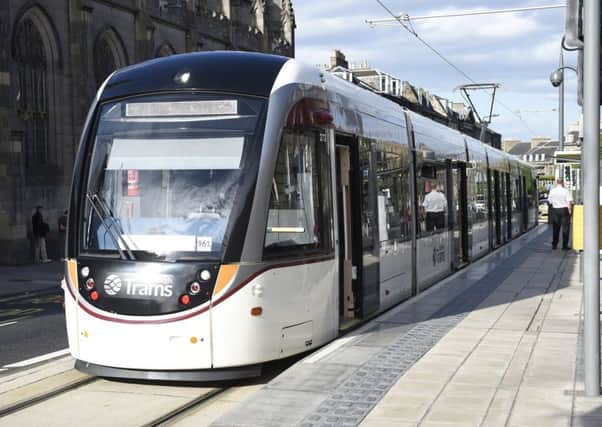Tram firm TIE wanted to rip up contract, inquiry hears


The tram inquiry heard yesterday that TIE – the council’s arms length company in charge of the project – still wanted to terminate the contract despite being told that their cost estimations for doing so were “unrealistic”.
And TIE persisted with the view that this was a better option than reaching a deal with contractors Bilfinger Berger despite advice from independent experts.
Advertisement
Hide AdAdvertisement
Hide AdAlan Coyle, a finance manager for the council’s city development team at the time, appeared before the inquiry’s chairman Lord Hardie to give evidence.
The inquiry heard a report presenting an outline of work on the project from January 2011 through to June 2012 had been co-authored by Mr Coyle and presented to Lesley Hinds, then transport and environment convener.
In a section detailing the run-up to mediation, the report stated that settlement with the existing contractor and reprocurement was TIE’s preferred strategy.
However it goes on to say TIE had made a number of “fatal flaws” in relation to “assumptions” made by the firm about this approach.
Advertisement
Hide AdAdvertisement
Hide AdThe report stated that TIE believed it would be able to terminate the contract for a price of £33 million, but that council officers did not believe this figure to be correct due to liabilities for delay and design change.
It goes on to set out that the route of termination and reprocurement was a route independent experts were advising against.
But Mr Coyle told the inquiry he felt TIE persistently went against this advice.
He explained: “It felt to me that in the lead-up to mediation, and after mediation, that the advice we were being provided by professional people, who know their business, that TIE were pursuing an option regardless of what that advice was giving us.
Advertisement
Hide AdAdvertisement
Hide Ad“I think it’s advice that should be listened to [but] I didn’t feel that TIE particularly wanted to listen to that advice.”
The report outlines that, in the council’s view, an adjustment of £150 million would have been required for termination and reprocurement.
Inquiry counsel Ross McClelland questioned Mr Coyle as to whether it was “surprising” that such a large adjustment had come out on day one of mediation, and after four months of preparatory work.
Mr Coyle responded: “It was very much a case that TIE were continuing to ignore these potential costs within that option, and, you know, there was discussions in the early part of mediation around, you know, that’s just unrealistic.
“I think they chose to ignore these particular items.
Advertisement
Hide AdAdvertisement
Hide Ad“I think they maybe had a very firm view of what that terminate and reprocure option would look like. I didn’t feel that they were willing to explore the potential for these additional costs.”
The inquiry previously heard how a deal was eventually thrashed out between Sue Bruce, then council chief executive, and Bilfinger Berger Siemens following a protracted dispute between the contractors and TIE.
The settlement involved the council agreeing to revised costs of £362.5 million for completion of the tramline from the airport to Haymarket (“off-street works”) and a further £39m to go from Haymarket to St Andrew Square/York Place (“onstreet works”).
However, Mr Coyle said it was clear TIE officials were not satisfied with the end amount.
Advertisement
Hide AdAdvertisement
Hide Ad“I don’t think the people from TIE thought it was a sensible price,” he said.
“I think the people from TIE thought they could have got an agreement or separation that could have been more financially advantageous.”
The settlement was reached following mediation talks at the exclusive Mar Hall hotel outside Glasgow, which took place between March 8 and 12, 2011.
The inquiry was read an email sent by negotiator Tony Rush on March 14, just days after the settlement was reached.
Advertisement
Hide AdAdvertisement
Hide AdIn it, it is claimed TIE chief executive Richard Jeffrey was “frozen out” of the mediation proceedings.
Questioned what he believed was meant by the term “frozen out”, Mr Coyle said: “I would say omitted from the lead discussions with Sue Bruce and Vic Emery.”
But he said it wasn’t true that Mr Jeffrey played no part at all in the negotiations, adding: “He was given every opportunity to contribute, but I think very much the discussions were led by Sue Bruce and Vic Emery who was the chairman, I think, of TIE at the time.”
The inquiry, which will enter its fourth week on Tuesday, looks to examine why the trams were delivered five years late at a hugely increased cost and on a truncated route.
Advertisement
Hide AdAdvertisement
Hide AdMr Coyle’s evidence follows news the controversial project could have been cancelled with a £40 million “amicable divorce” payment in 2010 but the information was not shared with the city’s councillors.
Witnesses due to give evidence next week include former TIE chief executive Michael Howell and former council deputy leader Steve Cardownie.